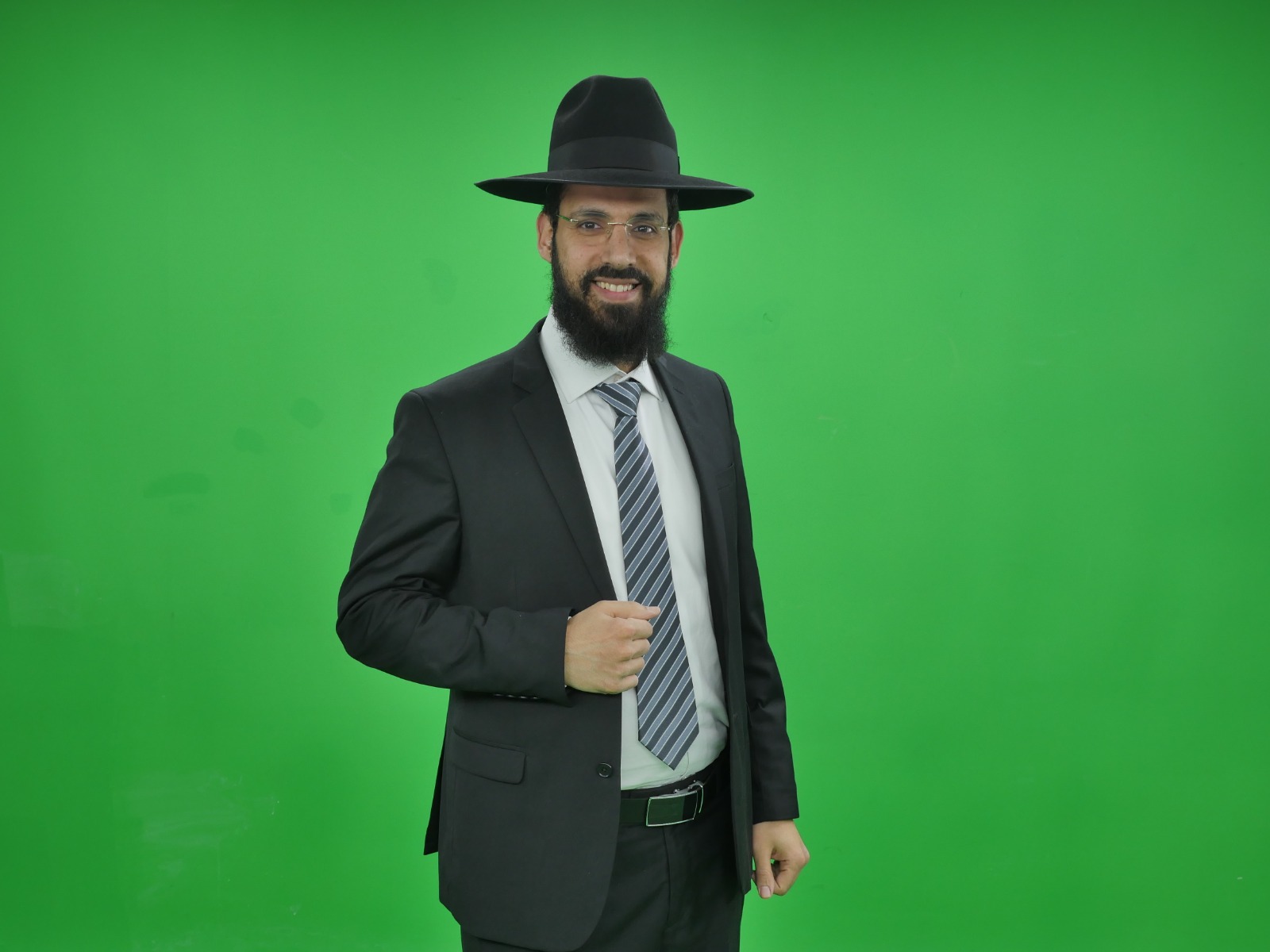"Knowing We Bring Peace to Families Is the Greatest Reward"
Rabbi Eliyahu Nakash began working in marital reconciliation almost by accident. Yet, when he encounters couples whose peace has been restored thanks to his efforts, he feels he has received the greatest reward.
 (In circle: Rabbi Eliyahu Nakash)
(In circle: Rabbi Eliyahu Nakash)Rabbi Eliyahu Nakash, a lecturer, psychotherapist, and marriage counselor who heads the Shalom Bayit department at Hidabroot, will find it hard to forget that evening. To an onlooker, it could have appeared like a standard dinner, with Rabbi Nakash and his wife hosting a young couple with a newborn. Only someone with sensitive sensors could detect what lay behind the meeting.
"It was a young couple who had planned to divorce shortly before," Rabbi Nakash recounts. "Everyone around them believed there was no hope in keeping them together. The difference between the spouses was vast. On one side, the husband, whom we will call Moshe, was an outspoken and opinionated person, while his wife, whom we will refer to as Chana, had a different style: quiet and reserved. In other cases, this difference would not necessarily pose a problem. On the contrary, it could have been a perfect point of connection between two opposites."
 Rabbi Eliyahu Nakash
Rabbi Eliyahu Nakash"However, here the husband's family intervened. It soon became apparent that in Moshe's family, the rules were clear, and anyone joining the family had to adhere to them. His mother set the tone with a firm hand, and all family members complied. Due to Chana's different disposition, she was viewed as disrupting the family unity, resulting in disdain towards her. Influenced by the family's destructive attitude, Moshe decided to take a step almost impossible to reverse: informing his wife that he was divorcing her. He came to us only to feel that he did everything possible to prevent the home's dissolution. His goal, which he did not hide from us, was to complete the process at the rabbinical offices. From his perspective, there was no turning back. Therefore, every attempt I made to work with him ended in a deadlock. The man resolved to divorce. From our side, we did everything to keep this home intact, both for the couple and their families, and, of course, for Hashem's sake, as our sages say: 'Anyone who divorces his first wife, even the altar—meaning Hashem—sheds tears on them.'"
"Shortly after we began working with them, the change occurred, and the couple discovered they were expecting a child. The husband realized that the decision to break up the family could have far-reaching consequences. This understanding led him to change direction and sincerely try to improve their marital life. Despite this, the disparity between his wife and family was significant, and soon another incident pushed the situation back to its original state. At this point, behind the background of expecting a child, we managed to penetrate the narrow opening Hashem opened before us. We uncovered Moshe's innermost feelings. It then became clear to him that he was a 'pleaser'—a person who constantly seeks to please those around him and ensures that no one gets angry with him. When forced to choose between his 'problematic' wife (in the eyes of his family) and his domineering family, he made the wrong choice."
"Consequently, we concluded that in this scenario, even if he brought another woman into the home, the problem would not be solved and could even worsen, given that his current wife is accommodating and kind-hearted. After a long deliberation, he came to us one day and announced: 'I have decided to stay.' The excitement was great on both our part and his. We continued to accompany the couple and maintain contact with them until we were confident that the foundations rebuilt in their home were strong enough to allow the couple to live happily and peacefully despite the challenges posed by their surroundings."
"When we invited them to dinner at our home after some time, they responded joyfully, arriving with the baby born to them in the meantime. Hardly any words were spoken during that emotional meeting, but mutual smiles between the couple and the special bond formed between them provided a wonderful ending to a long period of almost around-the-clock work. We left this dinner immensely satisfied, knowing we had prevented yet another tear of the altar from being shed over a Jewish home that could have shattered."
A Toolbox
Statistics show that every third couple in Israel gets divorced at some point in their lives. This complex situation turned the Shalom Bayit department at Hidabroot into one of the organization's most important departments. Rabbi Eliyahu Nakash, who previously served as a Torah teacher, leads the department. "The first time I encountered the issue of marital reconciliation was when one of the lesson participants approached me for advice. From there, more and more cases started coming my way. Initially, I refrained from providing answers because I didn't have the appropriate certification. After a while, I realized that I needed to study marriage counseling deeply so I could respond to public inquiries," says Rabbi Nakash.
"Indeed, I studied marriage counseling at a high level. Afterward, I took courses in emotional therapy methods such as CBT, NLP, and others, significantly expanding my toolbox. All this was done while consulting with experts in the field. Sometime later, I joined Hidabroot and became part of the team of advisors. Today, I have the privilege of heading a department that has created and will, with Hashem's help, continue to create a revolution concerning unity and peace in Jewish homes."
How do you provide solutions to couples who reach out to you?
"The hotline of the Shalom Bayit department receives inquiries from all over the country, and we provide comprehensive and professional responses that meet the expectations of the individuals on the other end," Rabbi Nakash tells us during a break between one counseling meeting and another. "Upon receiving the initial inquiry, the department's advisors investigate the problem's root and determine what professional response is needed. Based on these findings, we refer the individuals to one of the department's certified advisors, suitable for them and the type of issue they are facing."
 (Photo: shutterstock)
(Photo: shutterstock)When we asked what needs to be checked with an incoming inquiry, Rabbi Nakash smiled and said: "In most cases, those reaching out aren't aware of the root of the problem that brought them to us. They understand there is an issue that requires resolution, but they don't recognize the root, and that's precisely where our initial response, which includes very professional and specially experienced advisers, comes in. They thoroughly examine the inquiry, ask the appropriate questions, and then refer the couple to the expert who can, with Hashem's help, assist them."
"The location is also significant," notes Rabbi Nakash. "Our advisers are spread almost throughout the country, ensuring that the couple reaching out can easily attend a face-to-face meeting with an advisor." After the referral, the couple attends one-on-one, emotional, or other types of therapy, with an advisor from the Shalom Bayit department continuing to guide them throughout the process. "We check whether they indeed reached out to the advisor, and if so, whether they notice any change. If a problem arises along the way, we address it with the utmost speed, as time is a crucial factor in the success of the treatment."
From your experience in the field of emotional therapy, which of the two leading methods do you believe is better: CBT or NLP?
"It really depends," answers Rabbi Nakash. "Sometimes the CBT method, which is a cognitive approach that delves deeply into the individual's thoughts, helps couples. Other times, it is the NLP method, which operates more indirectly via the subconscious, that does better work. "For example, if someone approaches me mistakenly thinking that his wife doesn't love him, or that no one appreciates him, in such cases, I would work with him using the CBT method, which challenges the negative thoughts about himself. Conversely, when someone struggles to trace the foundational thoughts driving him, I use the NLP method, which indirectly achieves excellent results."
"In general," emphasizes Rabbi Nakash, "it's very important for a therapist to have a rich toolbox so they can tailor the treatment to the person standing before them. The more knowledge a therapist holds, the greater the chances of treatment success."
Moments Before the Rabbinate
Do you have a story you are particularly proud of?
Rabbi Nakash reflects. "I'll explain why I am pondering," he says. "After so many years in a tough profession and having handled numerous stories, it is difficult to choose just one. But there was a case where a woman called due to mistakenly thinking we could assist in her divorce proceedings with the Rabbinate. After we began speaking with her, she immediately clarified that she did not intend to seek counseling. So, I did not immediately refuse to assist her, but I asked her to first explain why she wanted a divorce.
 (Photo: shutterstock)
(Photo: shutterstock)"During the conversation, I realized she indeed had valid reasons for divorce. 'My husband is emotionally closed,' she said with pain, 'and he has anger outbursts.' After she shared her painful life story with us, we presented the situation from a different perspective, one hidden from her view for many years. We told her that even such a difficult and complicated case could be worked on and that there was still hope. She agreed and set a date for couples counseling as a last-ditch effort. From a random phone call, we transitioned to face-to-face meetings and then to a long-term support process that lasted a long period."
"During our work with the couple, we discovered that the husband had suffered from low self-esteem since childhood due to how others treated him and therefore rarely expressed opinions, leading both to anger outbursts and never showing emotion publicly. Through complex work, we taught him the language of emotion and worked with him to clean up the painful past. Today, these spouses live, for the first time since their marriage, good and happy lives—all thanks to... a wrong number."
In conclusion, do you have a tip for a good marriage that you want to share with the readers?
"To achieve a good marriage, you need to invest. If spouses wish for love and fellowship to prevail between them, they must work on it. It is important to understand that marriage is like other things in the world, which require driving force. Just as the electrical appliances in our homes need recharging from time to time, and similarly to how a car needs refueling periodically, we must know that good marital life requires maintenance. Without it, the connection between spouses will be lacking. Although maintaining the relationship requires investment, this investment is what will lead us to the happiness we desire."
Rabbi Eliyahu Nakash is the head of the Shalom Bayit department. To contact: 073-2221310 or Eliyahunu@htv.co.il

